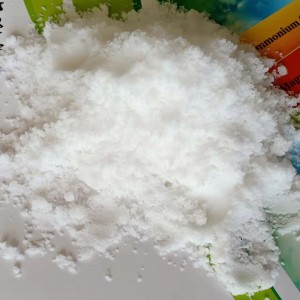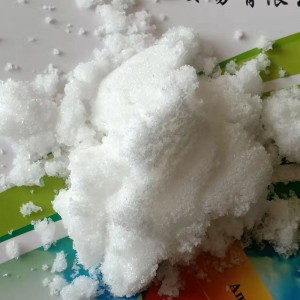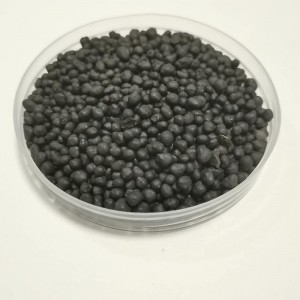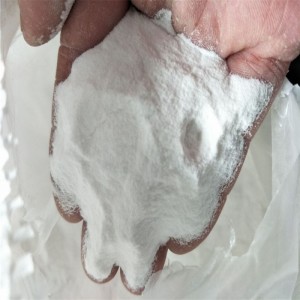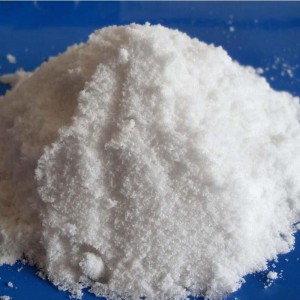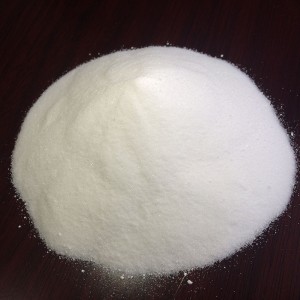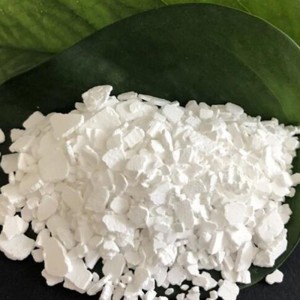Ammonium bicarbonate
Ammonium bicarbonate effect
1. Used as a nitrogen fertilizer, suitable for various soils, and can provide both ammonium nitrogen and carbon dioxide required for crop growth, but the nitrogen content is low and it is easy to agglomerate;
2. Used as an analytical reagent, also used in the synthesis of ammonium salts and fabric degreasing;
3. Used as chemical fertilizer;
4. It can promote crop growth and photosynthesis, promote seedlings to grow leaves, can be used as top dressing, or as base fertilizer for direct application, used as a food starter and expansion agent;
5. As a chemical leavening agent, China stipulates that it can be used for all kinds of foods that require leavening agents, and should be used in appropriate amounts according to production needs;
6. Used as a high-grade starter for food. Combined with sodium bicarbonate, it can be used as a raw material for leavening agents such as bread, biscuits, pancakes, etc., as well as a raw material for foaming powdered juice. It is also used for blanching green vegetables, bamboo shoots, etc., as well as medicine and reagents;
7. Alkali; leavening agent; buffering agent; aerating agent. It can be combined with sodium bicarbonate as a raw material for leavening agents for bread, biscuits, pancakes, etc. Baking powder also uses this product as the main ingredient, with acidic substances. Also used as raw material for foaming powder juice, green vegetables, bamboo shoots, etc., use 0.1%~0.3% when blanching;
8. Used as top dressing for agricultural materials.
9. Ammonium bicarbonate has the advantages of quick-acting, low-cost, economical, non-compacting soil, suitable for various crops and various types of soil, and can be used as base fertilizer and top dressing, and is welcomed by farmers. The annual consumption accounts for about 1/4 of the total nitrogen fertilizer output, which is the most widely used nitrogen fertilizer product in my country except urea. The disadvantages of ammonium bicarbonate are mainly volatile and low utilization of nitrogen. Therefore, in production, we should maximize our strengths and avoid our weaknesses, and use them reasonably.
a. Deeply cover the soil. Whether ammonium bicarbonate is used as a base fertilizer or top dressing, it must be applied deeply, and must not be sprayed on the soil surface to prevent nitrogen volatilization and cause nitrogen loss. According to relevant test results, deep application of ammonium bicarbonate can increase the utilization rate by 31.2%-32%, and its fertilizer utilization rate is not lower than that of urea and ammonium sulfate.
b. High temperature application should be avoided. Ammonium bicarbonate is relatively stable when the temperature is below 20°C. When the temperature is slightly higher or the moisture in the product exceeds a certain standard, it is easily decomposed into ammonia and carbon dioxide gas and escapes in the air, causing the loss of nitrogen fertilizer efficiency. According to relevant test results, the application of ammonium bicarbonate to winter crops is better than urea. Because of the low temperature in winter, the urea conversion process takes a long time, and the application of ammonium bicarbonate can be directly absorbed without conversion, which is beneficial to the early growth of winter crops. In addition, after ammonium bicarbonate is applied to the soil, the dissociated ammonium ions can be directly adsorbed by the soil colloid, and after urea is applied to the winter crop soil, the urea is dissolved in the soil solution in a molecular state and cannot be adsorbed by the soil colloid, which is easier Cause the loss of fertilizer.
c. It should be combined with farming. When ammonium bicarbonate is used as basal fertilizer, it should be combined with deep application on the cultivated land. It can be applied in furrow or hole. The application depth should be greater than 6 cm, and the soil should be covered immediately after application to reduce the loss of nitrogen. When ammonium bicarbonate is used as top dressing, dry land can be combined with intertillage and deep application, and then cover the land immediately, and water in time. The paddy field should maintain a water layer of about 3 cm deep, too shallow and easy to damage the roots, and immediately plough and harrow after application.
d. Pay attention to prevent fertilizer damage. Ammonium bicarbonate should not be used as a seed fertilizer to prevent it from affecting the germination of seeds; prevent contact with seeds, roots, stems and leaves during application to avoid burns to plants. For example, when ammonium bicarbonate is used as top dressing, remember not to spread it just after it rains or before the dew is dry.
1. Used as a nitrogen fertilizer, suitable for various soils, and can provide both ammonium nitrogen and carbon dioxide required for crop growth, but the nitrogen content is low and it is easy to agglomerate;
2. Used as an analytical reagent, also used in the synthesis of ammonium salts and fabric degreasing;
3. It can promote crop growth and photosynthesis, promote seedlings to grow leaves, can be used as top dressing, or as base fertilizer for direct application, as a food expansion agent;
4. Used as a high-grade starter for food. Combined with sodium bicarbonate, it can be used as a raw material for leavening agents such as bread, biscuits, pancakes, etc., as well as a raw material for foaming powdered juice. It is also used for blanching green vegetables, bamboo shoots, etc., as well as medicine and reagents;
5. Used as a buffer; aeration agent. [4]
6. Ammonium bicarbonate is widely used in the plastic and rubber industries, pottery making, chrome tanning and synthesis catalysts.
7. Ammonium bicarbonate has the advantages of quick-acting, low-cost, economical, non-compacting soil, suitable for all kinds of crops and all kinds of soil, and can be used as base fertilizer and top-dressing fertilizer. It is welcomed by farmers. The annual consumption accounts for about 1/4 of the total nitrogen fertilizer output, which is the most widely used nitrogen fertilizer product in my country except urea. The disadvantages of ammonium bicarbonate are mainly volatile and low utilization of nitrogen. Therefore, in production, we should maximize our strengths and avoid our weaknesses, and use them reasonably.


